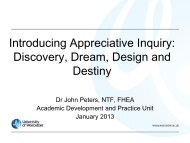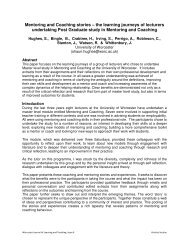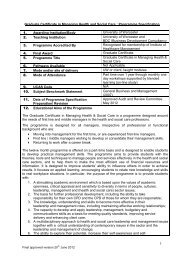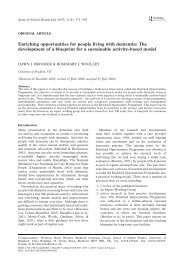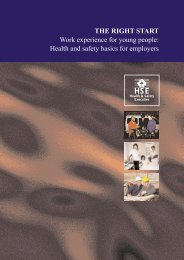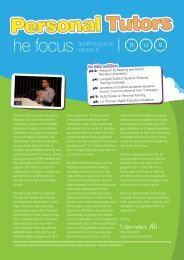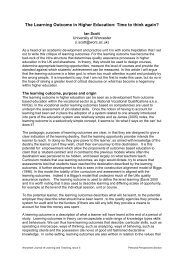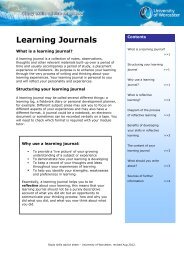November 2011 - University of Worcester
November 2011 - University of Worcester
November 2011 - University of Worcester
- No tags were found...
Create successful ePaper yourself
Turn your PDF publications into a flip-book with our unique Google optimized e-Paper software.
Insight into life behind a lab coatPupils from a Redditch school spent the day making DNA smoothiesand carrying out DNA tests as part <strong>of</strong> a biology discover day at the<strong>University</strong> <strong>of</strong> <strong>Worcester</strong>.The <strong>University</strong>’s Institute <strong>of</strong> Science &the Environment hosted the event to giveschoolchildren an insight into life behind a labcoat.Eleven students, from Trinity High School inRedditch, spent the day in the <strong>University</strong>’sDarwin lab with Dr Lee Byrne, Dr MikeWheeler and Mark Cook.The students were given an overview by DrByrne <strong>of</strong> what it is like to study Biology at<strong>Worcester</strong>, the kinds <strong>of</strong> research that members<strong>of</strong> staff were involved in and crucially the kind<strong>of</strong> jobs that a degree in Biology might enablethem to consider in the future.The students then had an intensive practicalsession including making an ‘alcoholicbanana DNA smoothie’; making an agarosegel and running DNA to figure out a forensic‘whodunnit’ and identifying human whiteblood cells by microscopy.Dr Byrne said: “The session was a great success.The students were really eager and enthusiasticand it was a great pleasure to spend half a daywith them. The feedback from Trinity High wasexcellent.”Trinity High teacher, CarneaWoods, said that the studentshad a “fantastic day” and Head <strong>of</strong>Sixth Form, Jeremy Petit, said heknew “that next term, when in year13, many <strong>of</strong> these students will put<strong>University</strong> <strong>of</strong> <strong>Worcester</strong> down asone <strong>of</strong> their choices.”Dr Byrne added: “It was a greatday and we hope to put on manymore ‘Discover Biology at <strong>Worcester</strong>’ sessions.Many thanks also to Biology undergraduateDragana Catici, Dr Karen Blackmore from theInstitute <strong>of</strong> Education, and Mike’s lab assistant,Susan Harding, for their help and showing suchgreat enthusiasm with the students.”Any schools interested in taking partin Discovery Days at the <strong>University</strong> <strong>of</strong><strong>Worcester</strong> should contact the Schools andColleges Liaison Service atd.crawford@worc.ac.uk or call 01905 855393.Chapter explores changing nature <strong>of</strong> librariesJudith Elkin, Pr<strong>of</strong>essor Emeritus <strong>of</strong>Children’s Literature, has writtenabout the changing nature <strong>of</strong> librariesand the impact on children.In a chapter published in Libraries andSociety: Role Responsibility and Futurein an Age <strong>of</strong> Change, Pr<strong>of</strong>essor Elkin,a recognised authority on librariesfor children and young people, looksat how ‘libraries might cater for themany and varied needs <strong>of</strong> the child.’Pr<strong>of</strong>essor Elkin, places libraries at the heart <strong>of</strong> education,explaining that they play a vital role in developing earlyliteracy and allowing children to develop in a friendlyenvironment, ‘regardless <strong>of</strong> age, gender, race, wealth,physical or intellectual ability or geographical location.’The question facing libraries now is how they will continue toprovide a valuable service, whilst responding to a rapidly changingworld in which the future <strong>of</strong> the written word is becominglyincreasingly uncertain. But as Pr<strong>of</strong>essor Elkin asserts, librariesare responding well, expanding their services to incorporatemultimedia, audiovisual and computer technology.DiscoverydaysNEWSDramaDiscover, engage, inspireDiscoverydaysBiologyimaginative model for library users. Indeed, no-one could havefailed to notice the shiny new ‘super’ library that is currently underconstruction. Due to open in July 2012, the building is Europe’sfirst fully integrated public and university library, housing a quarter<strong>of</strong> a million books, journals, DVDs and music collections.Pr<strong>of</strong>essor Elkin regards <strong>Worcester</strong>’s new library as a ‘symbol <strong>of</strong>shared learning, culture and information that contributes uniquelyto the regeneration <strong>of</strong> <strong>Worcester</strong>.’ She dismisses the idea thatthe new library could be considered elitist given its focus on‘accessibility, transparency, flexibility, community, regenerationand partnership’. Younger users in particular will benefit fromthe expertise <strong>of</strong> specialist librarians as well as activities that aimto develop reader’s abilities. Children will also have differentspaces for both quiet work and noisier, creative activities.Discover, engage, inspirePr<strong>of</strong>essor Elkin cites the soon-to-be-unveiled <strong>Worcester</strong> Libraryand History Centre, known as The Hive, as an innovative andImpression <strong>of</strong> how children will use The Hivenewsandviews@worc.ac.uk / NOVEMBER <strong>2011</strong> / 9



